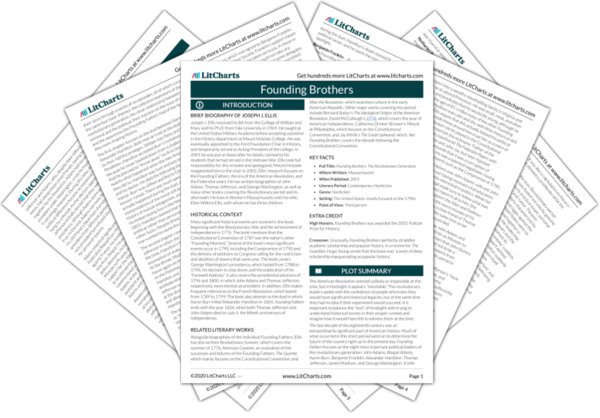Thomas Jefferson Quotes in Founding Brothers
In fact, Jefferson’s headache coincided with a veritable plague that seemed to descend on the leadership of the Virginia dynasty. Madison was laid up with dysentery, Edmund Randolph remained in Virginia to care for his wife, who had nearly died delivering a stillborn baby, and, most ominously of all, George Washington came down with the flu and developed pulmonary complications that the physicians considered life-threatening. "You cannot conceive the public alarm on this occasion," Jefferson reported to William Short, his former secretary in Paris, adding that Washington's demise would in all probability have meant the abrupt end of the whole national experiment.
The permanent residence of the capital on the Potomac institutionalized political values designed to carry the nation in a fundamentally different direction. It was also symbolic in a personal sense for Jefferson and Madison. For the Compromise of 1790 signaled the resumption of their political partnership after five years of separation. Now, “the great collaboration" was truly an alliance worthy of its name.
For that city and the name it was destined to carry, symbolized the conspiracy that threatened, so Jefferson and his followers thought, all that Virginia stood for.
Jefferson's position on political parties, like his stance on slavery, seemed to straddle a rather massive contradiction. In both instances his posture of public probity—slavery should be ended and political parties were evil agents that corrupted republican values—was at odds with his personal behavior and political interest.
The correspondence can be read as an extended conversation between two gods on Mount Olympus because both men were determined to project that impression.

Thomas Jefferson Quotes in Founding Brothers
In fact, Jefferson’s headache coincided with a veritable plague that seemed to descend on the leadership of the Virginia dynasty. Madison was laid up with dysentery, Edmund Randolph remained in Virginia to care for his wife, who had nearly died delivering a stillborn baby, and, most ominously of all, George Washington came down with the flu and developed pulmonary complications that the physicians considered life-threatening. "You cannot conceive the public alarm on this occasion," Jefferson reported to William Short, his former secretary in Paris, adding that Washington's demise would in all probability have meant the abrupt end of the whole national experiment.
The permanent residence of the capital on the Potomac institutionalized political values designed to carry the nation in a fundamentally different direction. It was also symbolic in a personal sense for Jefferson and Madison. For the Compromise of 1790 signaled the resumption of their political partnership after five years of separation. Now, “the great collaboration" was truly an alliance worthy of its name.
For that city and the name it was destined to carry, symbolized the conspiracy that threatened, so Jefferson and his followers thought, all that Virginia stood for.
Jefferson's position on political parties, like his stance on slavery, seemed to straddle a rather massive contradiction. In both instances his posture of public probity—slavery should be ended and political parties were evil agents that corrupted republican values—was at odds with his personal behavior and political interest.
The correspondence can be read as an extended conversation between two gods on Mount Olympus because both men were determined to project that impression.











